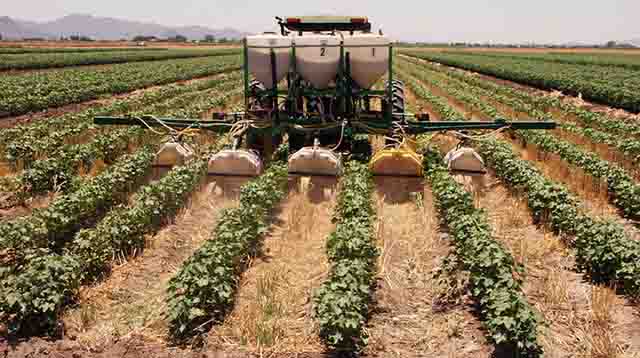Sutton Morgan owns Oasis Organics, a certified organic farm comprising roughly 2,500 acres in the Imperial Valley in the southeastern region of California.
Like a growing number of farmers, Morgan is pushing sustainability first, which presents a number of challenges. Both traditional and organic farmers face labor shortages and higher production costs.
“I cannot use chemicals as an organic farmer, so my option is labor. Weeding by hand, and with minimum-wage laws and rising labor costs, I’m forced to look for other options, so I can stay in business,” Morgan said.
That is where Morgan has relied on Mark Siemens, a University of Arizona Cooperative Extension expert and researcher who works to integrate advanced technology with farming.
Siemens, an agricultural engineer in Yuma, is developing and evaluating new machine systems meant to improve the profitability, sustainability and environmental soundness of vegetable and fruit production systems.
Many machines capable of this work were developed in Europe. Now Siemens is trying to determine if they also can be put to work at U.S. vegetable farms.
“We conducted field trials to determine their efficacy and the amount that hand-weeding labor requirements were reduced,” said Siemens, an associate specialist and professor in the Department of Agricultural and Biosystems Engineering. “We also provided the opportunity to have growers evaluate the technology on their farm so they could make their own decisions about how the technology would fit into their farming operation.”
In addition to evaluating these machines, Siemens is part of a team designing a prototype that uses a camera-based vision system to differentiate between crop plants and weeds. Based on data from the camera, a sprayer nozzle is then activated to spray weed-killer on individual weeds.
The team, involving researchers and others from the University of California, Davis, and Washington State University, is developing this precision weeding machine to remove weeds close to crop plants. The work is supported by a U.S. Department of Agriculture National Institute of Food and Agriculture Specialty Crop Research Initiative Grant at $2.7 million. The four-year grant arrived in 2014, and a $300,000 portion went to Siemens.
Siemens’ work is something Yuma farmers appreciate.
“As farmers, we’re laypeople. We don’t really understand all of the technology and what it takes to make it work,” said Steve Alameda, a partner with TopFlavor Farms in Yuma and president of the Yuma Fresh Vegetable Association.
Alameda and others, such as Morgan, work side-by-side with Siemens to evaluate and test the new machinery.
“We do what we need to do to give indication of where we need help, and then their expertise kicks in to really solve the big problems and get into the details,” Alameda said about Siemens and other Cooperative Extension specialists in Yuma. “They come up with practical things that work for us. And it’s all about trying to stay in business.”
Siemens and his collaborators are currently integrating the machine vision and sprayer assembly components and plan to test the prototype this summer, most likely in Salinas, Siemens said.
“I’ve seen it, and worked with him on these machines — they’re good,” Alameda said, adding that it has been regularly beneficial to work with Cooperative Extension experts and researchers. “They’re seeking out what we’re doing, and they try to find out what problems we have, and what they can do to help.”
That’s the part of his job Siemens said he especially enjoys.
“I enjoy solving engineering-type problems and helping people with technology,” he said. “It’s a good feeling when you share what you’ve learned and people benefit from that information.”




